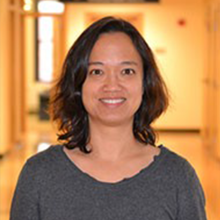January 2020 Spotlight on SRCD U.S. State Policy Fellow: Alicia Miao, Ph.D.
Alicia Miao, Ph.D., is a former SRCD State Policy Post-doctoral Fellow who was placed in the Early Learning Division, Oregon Department of Education.
As I sat down to reflect upon my experiences as an SRCD State Policy Post-doctoral Fellow, I first wanted to express my gratitude. I am grateful for the SRCD policy team and funders who made this state-level policy opportunity possible, and for the dedicated agency staff, state and research mentors, peers, and community partners who were invaluable educators and collaborators during my experiences as a fellow.
I completed my year-long fellowship with the Early Learning Division (ELD) of the Oregon Department of Education in September 2019. The ELD is responsible for the administration of state and federally funded early childhood and education programming, state childcare licensing and monitoring, and early learning system coordination and management in collaboration with local early learning partners. The ELD is the lead Oregon agency for the Child Care and Development Block Grant (CCDBG), a grant program that is the primary source of federal funding which states use to provide childcare assistance for low-income families, and also houses the state’s Head Start Collaboration Office.
I was fortunate to work on Oregon’s Preschool Development Grant Birth through Five (PDG B-5) throughout my fellowship year. The PDG B-5 Funding Opportunity Announcement was released just as I began the fellowship, and the ELD led Oregon’s PDG B-5 grant application. I initially joined a small team of staff to attend a Technical Assistance and Peer Learning Meeting, coordinated in part by the BUILD Initiative, the Alliance for Early Success, EducationCounsel, the Ounce of Prevention, the Policy Equity Group, the National Institute for Early Education Research (NIEER), and the Center for Enhancing Early Learning Outcomes (CEELO). This meeting was designed to provide consultation and technical assistance to support states in the PDG B-5 application process. My involvement turned into an opportunity to work on brainstorming, narrative writing, and project timeline, as well as the initial budget for the statewide needs assessment. After the PDG was funded, I continued to work on implementation of the needs assessment. This was an amazing growth experience and allowed me to continue to participate in cross-organization work helping to align and communicate the needs of the agency and external research teams.
Throughout my fellowship I was also involved with a Researcher-Practitioner Partnership (the Partnership for Preschool Improvement, PPI-RPP) working to improve publicly funded preschool programming in Oregon. Some of my fellowship activities related to the PPI-RPP included a qualitative analysis of provider surveys, quantitative analysis of observational data, interviews with agency staff, and working with research, agency, and local partners to create and implement a system to collect data for continuous quality improvement (CQI) purposes. It was illuminating to see program and policy work move forward through working partnerships between multiple researchers and agency staff.
Additional fellowship projects were varied and gave me a broad view of the multi-level multi-sector nature of the early childhood and education landscape in Oregon. Activities ranged from helping to facilitate stakeholder engagement sessions to collaborating on the creation of an evaluation plan for a new program to deep dives into procurement options and statewide assessment measures. Engaging in system-building activities through regional and statewide convenings illustrated to me the challenges that can be involved in working with entities and individuals holding different priorities, perspectives, and backgrounds.
Oregon experienced a great deal of change related to early childhood policy last year, and it was exciting to be at the ELD during this time. I gained an understanding of the varied cadences of Oregon’s legislative session by working on tasks that changed in purpose, speed, and intensity across the session, depending on the needs of the legislature. There were several firsts, such as tracking bills related to the ELD, writing fiscal impact statements and budget analyses, helping respond to questions raised in committee, and attending legislative hearings. I learned that there are many opportunities for research to be utilized in the various stages of bill making, framing information for legislators, and supporting informed iterative decision-making processes.
In the months following my fellowship, I have continued to work on the state’s PDG B-5 Needs Assessment, PPI-RPP, and efforts to support the state’s early learning system strategic plan. It is immensely fulfilling to see contributions begun during my fellowship year come to fruition, be involved in building on and extending those investments, and stay connected to the dedicated individuals I have come to know over the year. The SRCD State Policy Post-doctoral Fellowship provided me with an unmatched opportunity to understand that there are many ways in which research and policy are linked. I gained a nimbleness and flexibility in my working style throughout the year and saw firsthand the variety of roles that researchers can play to work towards change together with policymakers. My experiences as a fellow have had an indelible impact on my perspective as a developmental scientist and have inspired me to actively engage in work linking research, policy, and practice in my career moving forward.
